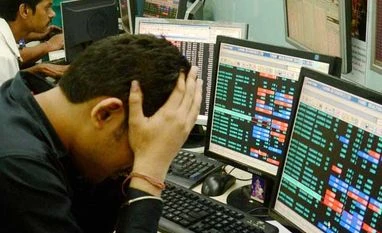Sensex on Monday ended with losses for a sixth straight day — its longest losing streak since August 2015 — on uncertainty arising out of note ban. The 30-share index fell 385 points, or 1.5%, to close at 25,765, its lowest level since May 25. The Sensex has lost 1,826 points, or seven %, since November 8, when Prime Minister Narendra Modi announced recall of existing Rs 500 and Rs 1,000 notes, 86% of the currency in circulation, to crack down on black (unaccounted) money.
The Nifty index fell 1.8%, or 145 points, to 7,929 on Tuesday, even as most other global markets traded positive.
"Note ban could dent businesses, trade, and jobs, and the impact could go beyond December," said Shankar Sharma, chief global strategist, First Global.
Meanwhile, rupee ended at a near nine-month low of 68.13 against the dollar. Foreign institutional investors (FIIs) sold shares worth Rs 1,311 crore on Tuesday. In the past eight sessions, FIIs have pulled out Rs 11,500 crore ($1.7 billion) from the Indian market.
Other emerging markets (EMs), too, have seen sharp FII sell-off since Donald Trump's victory in the US presidential elections on November 8. Despite fewer direct links to the US than other EMs such as Mexico, India has been one of the worst-performing EMs in dollar terms since November 8, primarily due to note ban.
"Randomness of events (Brexit, note ban, Trump victory) has put a lot of uncertainty in markets. Brexit, or United Kingdom's decision to leave the European Union, led to currency upheaval, and Trump will lead to policy uncertainty in the US, the world's largest economy and the biggest source of funds. India's note ban will lead to questions on the growth theory of India itself," said Motilal Oswal, chairman and managing director, Motilal Oswal Financial Services.
More From This Section
With the losing streak, both Sensex and Nifty have erased gains made so far this year.
"We expect the rest of 2016 to be highly uncertain," said Abhay Laijawala, head of India equities research at Deutsche Bank, which cut its year-end target to 25,000 from 27,000 for Sensex.
Automobile, consumer, non-banking financial services, cement, and real estate have seen sharp erosion in their stock prices since November 8. Analysts see a sharp fall in their net profit due to note ban. On Monday, among the biggest losers on Sensex were State Bank of India, which fell 6.5%, Maruti Suzuki, 3.5%, and Tata Motors, 3%.
"Government will have to provide some stimulus to boost businesses. It is difficult to quickly go back to the economic momentum before the note ban. Banks are getting high deposits, but will see difficulty in loan pick-up," said Sharma.
Racked since November 8
Rs 9.2 lakh crore: Indian market has lost
Monday close: of Sensex, Nifty lowest since May 25
Rs 11,500 crore: or $1.7 billion foreign investors have pulled out
10 Sensex companies: down nearly 10 per cent
Sensex, Nifty: down over 7 per cent; rupee down 3 per cent
After losing streak: dollar returns are negative 4 per cent for Sensex this year
)